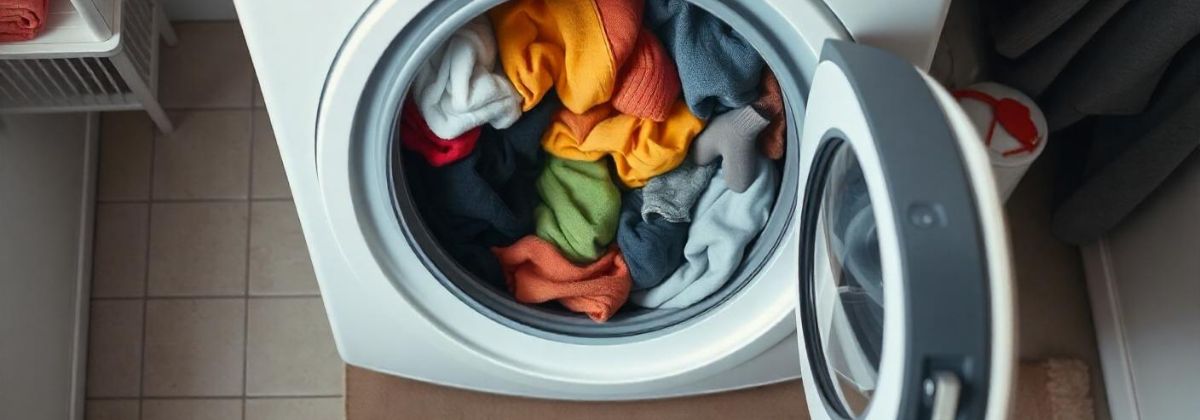23 Sep The Hidden Dangers of Overloading Your Washing Machine: What You Need to Know
In our busy lives, squeezing as much laundry as possible into a single load is tempting. We throw in extra clothes, towels, and bedding, hoping to save time, water, and electricity. However, overloading the washing machine has many hidden dangers that can seriously damage your appliance and your clothing. In this blog, we’ll explore the effects of overloading your washing machine, discuss why regular washing machine maintenance is essential, and offer practical tips on extending the life of your washer.
Why Overloading Washing Machine is a Problem
Your washing machine might seem sturdy, but it’s a precisely engineered appliance with a specific capacity. Overloading it causes wear and tear much faster than if you were to operate it with the correct load size. Let’s dive into some of the key dangers:
1. The Strain on the Washing Machine’s Motor
One of the most immediate effects of overloading washing machine is its strain on the motor. The motor spins the drum and powers the washing cycle. When you cram too many clothes into the machine, the motor has to work harder to rotate the drum, as the excess weight makes it difficult for the appliance to function smoothly.
This added strain can cause overheating, reduce the machine’s efficiency, and eventually lead to motor failure. Repairing or replacing a washing machine motor can be expensive and, in some cases, may not even be worth it compared to the cost of a new machine. Overloading the washing machine repeatedly can also cause long-term damage that shortens the overall lifespan of the appliance.
2. Washing Machine Drum Damage
The washing machine drum is another crucial part of your washer that suffers when you overload it. Washing machine drums are designed to spin at high speeds, ensuring your clothes are thoroughly washed and rinsed. However, when the drum is overloaded, it becomes unbalanced. This imbalance can lead to physical damage, such as warping, cracks, or dents in the drum itself.
An unbalanced drum also causes the washer to vibrate excessively during spin cycles. Over time, these vibrations can damage internal components like bearings and shock absorbers, leading to more serious washing machine problems and costly repairs or even replacement.
3. Clothing Damage from Overloading
It’s not just your washing machine that suffers; overloading can also wreak havoc on your clothes. When you overload the washer, your clothes are jam-packed in the drum, preventing them from moving freely during the wash cycle. This lack of movement means your clothes aren’t evenly cleaned, and detergent isn’t properly distributed. This makes clothes dirty or soapy, even after a full cycle.
Additionally, the friction between tightly packed clothes can cause fabric damage. Items rub against each other more aggressively, leading to wear and tear, fraying, and even holes. If you’re washing delicate fabrics like silk, lace, or knits, the risk of damage is even higher. Understanding proper laundry load size can protect your garments and prevent unnecessary clothing damage.
4. Overloading Reduces Cleaning Efficiency
One of the lesser-known consequences of overloading your washing machine is significantly reduced cleaning efficiency. Washing machines allow clothes to move freely in the drum so that water and detergent can penetrate and remove dirt. When the drum is overloaded, the clothes don’t have enough space to move around. This means they aren’t properly washed, rinsed, or spun.
In many cases, you’ll have to rewash clothes that weren’t cleaned properly, which wastes water and electricity. Instead of saving time, overloading the washer ends up costing you more in the long run.
5. Shortened Washing Machine Lifespan
Washing machines are expensive appliances, and nobody wants to replace one prematurely. Overloading your washing machine consistently leads to wear and tear on its most important parts—such as the motor, drum, bearings, and suspension system. Over time, this excessive strain results in breakdowns, leaving you with a washer that needs frequent repairs or replacement much sooner than expected.
Every machine has a load limit, which is typically listed in the washing machine capacity guide that comes with the appliance. Ignoring this guide and regularly overloading the machine drastically reduces its lifespan. Avoiding overloading is the first step in extending your washing machine’s lifespan.
Signs of Overloading Your Washing Machine
How do you know if you’re overloading your washing machine? Here are a few clear signs:
- Loud banging noises: If your washer makes unusual sounds during the spin cycle, the load may be too heavy or unevenly distributed.
- Excessive vibrations: When the drum is not unbalancing, the entire machine shakes. You might notice the washing machine moving across the floor, a major red flag.
- Poor cleaning results: Clothes that come out dirty, soapy, or improperly clean indicate that the drum is too full to allow effective washing.
- Wet clothes after the spin cycle: If your clothes are still sopping wet after the spin cycle, the washer may be overloaded and unable to properly spin the water out.
7. Laundry Efficiency Tips to Prevent Overloading
Preventing washing machine problems caused by overloading is easy with a few smart tips:
- Stick to load size recommendations: Every washing machine has a recommended load size based on capacity. Pay attention to these limits. For example, an 8kg washing machine can simultaneously hold about 40 T-shirts or a few bath towels and sheets. Don’t exceed these guidelines.
- Test the drum space: As a rule of thumb, you should be able to place your hand vertically inside the drum with all the clothes in and still have some space left between your hand and the top of the load.
- Sort your laundry by weight: Avoid washing heavy items like blankets or towels with lighter items. Instead, do separate loads for bulky items to avoid unbalancing the drum.
- Balance the load: Distribute laundry evenly around the drum. Don’t pile everything on one side, as this will make the machine work harder and lead to unbalanced loads.
How to Prevent Washing Machine Damage
Taking good care of your washing machine can prevent many of the issues associated with overloading. Here are some washing machine care tips:
- Clean the drum and filter regularly: Regularly cleaning the drum and the filter keeps your washing machine running efficiently and prevents blockages.
- Check for wear and tear: Inspect the door seal and hoses for any signs of damage or leaks.
- Avoid using too much detergent. Excess detergent can cause residue to build up, leading to mechanical issues.
- Schedule regular maintenance checks: Hire a professional to check your washing machine at least once a year to ensure it’s running smoothly and address any small problems before they become major issues.
The Last Word
Overloading washing machines may seem like a quick fix for getting through mountains of laundry, but the hidden dangers far outweigh the perceived benefits. From motor strain to washing machine drum damage and clothing damage, overloading results in inefficient cleaning, increased wear and tear, and ultimately, a shorter appliance lifespan. To prevent these issues, follow the manufacturer’s guidelines for the proper laundry load size and invest time in regular washing machine maintenance. Doing so will protect both your clothes and your washer, saving you money in the long run while improving the quality of your laundry.




Sorry, the comment form is closed at this time.